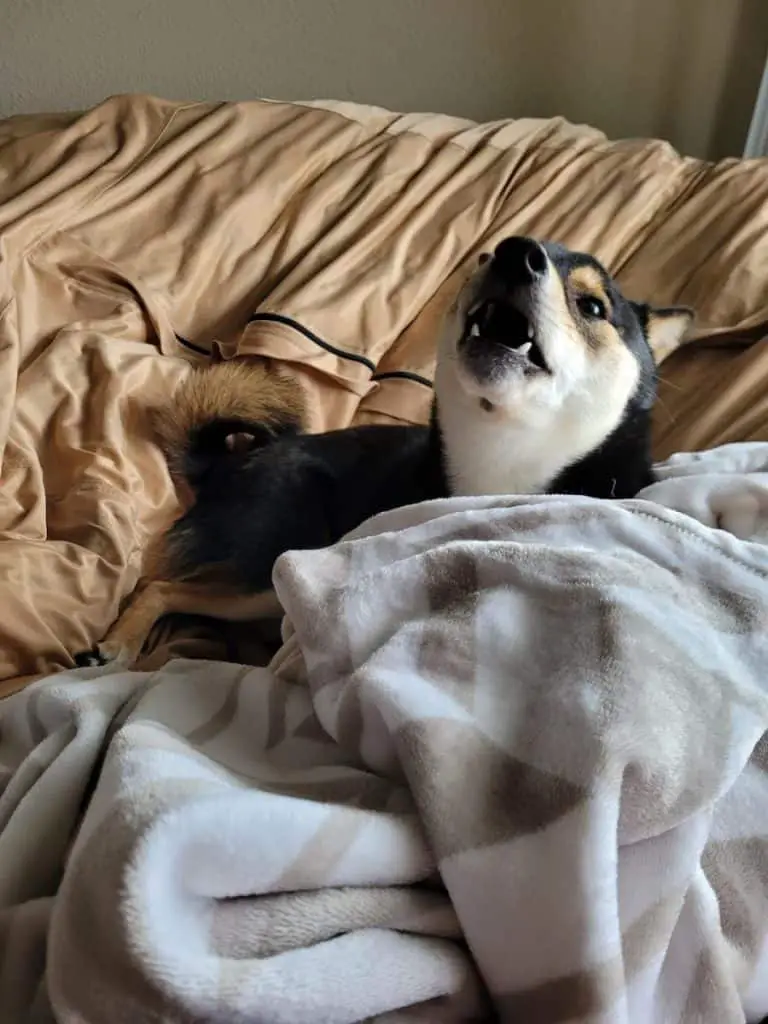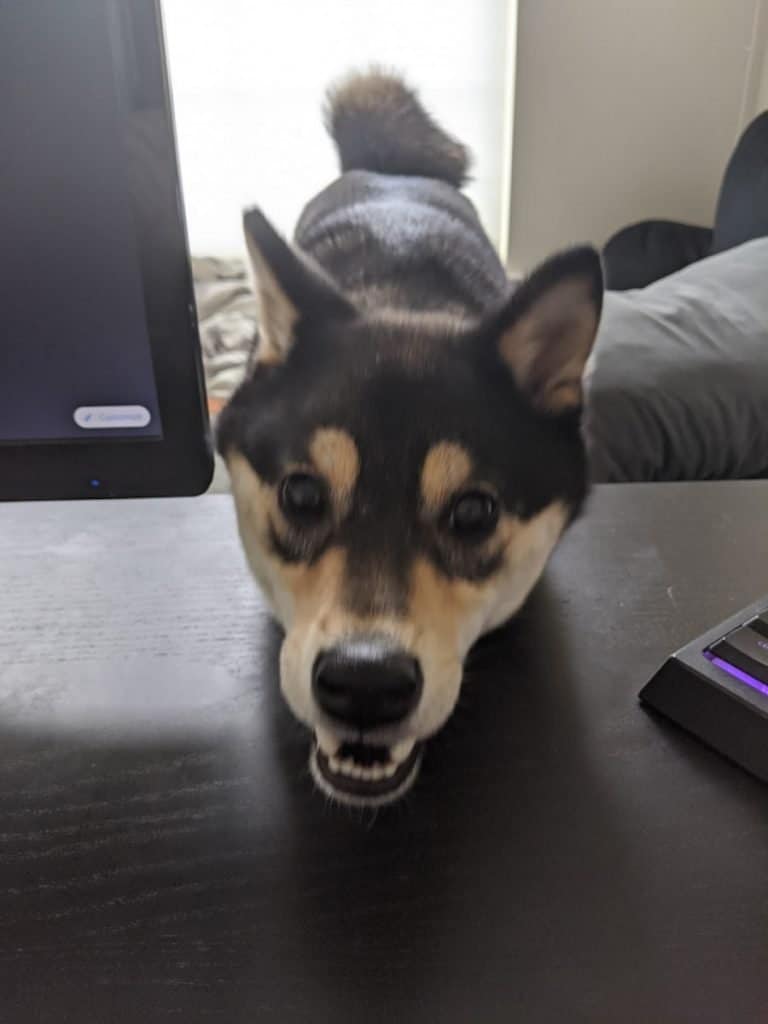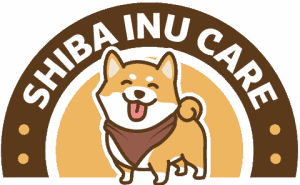This post contains affiliate links.

Excessive barking and whining was a real struggle for me, screaming what just the cherry on top. Over time I’ve noticed that each action my Shiba Inu takes has a root cause, here is what I’ve been able to learn and do about it.
Shiba Inus are generally a quiet apartment-friendly breed unless provoked. Each noise a Shiba Inu makes has a cause and effect. The best way to remedy excessive barking, whining, or screaming is to identify the root cause, interrupt their train of thought, and redirect them to more desirable behaviors.
Let’s go over the list of common causes and solutions I’ve been able to find and test.
Why Your Shiba Inu Keeps Barking, Screaming, Whining, …
Dogs, like children, love to voice their thoughts.
Although Shiba Inus are normally quiet dogs, they will bark or scream when given a reason. That “normally quiet” nature of theirs makes them great apartment dogs.
But that “bark for a reason” part can be a real nightmare to tackle.
It doesn’t matter what kind of noise they won’t stop making: Barking, growling, howling, screaming, squealing, whining, or even crying.
The biggest step in stopping consent barking or other noises is finding the root cause. We have a reason to talk just like our dogs have a reason to bark, and knowing that reason makes all the difference in stopping that seemingly neverending behavior.
Some of the most common reasons are:
To Alert You
Let you know if someone or something is near your property.
Anxiety
Stress, anxiety, fear, and frustration can be overwhelming for pets, and barking is both an emotional release and a cry for help.
Attention Seeking Behavior
Barking is a fantastic attention grabber, usually used when they are bored.
Boredom
Mental stimulation is important for all dogs, even more so for intelligent breeds like Shiba Inus. If there isn’t enough going on Shibas turn to attention-seeking behaviors.
Communication
Barking is a core part of your pet’s communication. It’s how they express themselves and let you know what’s happening.
Compulsive Behavior
Generally paired with pacing around, barking is their way of filling the “quiet” they are in.
Being Defensive
To scare and deter potential threats.
Demand Barking
More common in puppies, it’s their way of stating or demanding something goes their way as a child would.
Over Excitement
Barking, whining, or screaming is common when playing, greeting people, or seeing you when you get home.
Excessive Energy
Similar to boredom and excitement, excess energy can lead your pet to do crazy and wacky things to entertain themselves. Pent-up energy for dogs is usually released as barking.
Lack of Socialization
Dogs are fearful of the unknown like other people, animals, sounds, or experiences. A lack of social skills and experiences is usually to blame if your pup barks at every new sound, smell, and sight. Shiba Inus can be timid or even fearful of new people, leaving barking or aggression as their default response.
Loneliness
Although Shiba Inus are normally a cat-like independent breed, they still get lonely and crave human attention.
Separation Anxiety
Barking, pacing, depression, and destructive behaviors are all common symptoms of separation anxiety. Usually caused by prolonged alone time with no social interactions. This can be difficult to treat and usually requires professional help.
Stress
Fear or agitation can drive your dog to get aggressive, bark, bite, whine, or cry.
Territorial Aggression
Aggressive behavior is when they perceive something or someone invading what they consider “their” area. Shiba Inu aggression is a serious cause for concern and should be handled immediately before it gets out of hand.
A Warning
to keep others away from their toys or food, if left unchecked these “warnings” can evolve into aggressive behaviors and habits.
While Shiba Inus are more likely to scream or howl more than bark, it’s all handled the same.
Rewarding or responding to your Shiba’s vocalizations will train them to be more vocal and outspoken, so be careful.
Take some time to watch and really understand what your pet is both thinking and responding to. It could be a car driving by, an empty food bowl or they may just need to go potty. Knowing makes all the difference when it comes to resolving and potentially discouraging their behavior.
FUN FACT – Shiba Inu’s make many unique and interesting sounds but have the same vocal cords other breeds have.
How To Stop Non-Stop Barking

The biggest problem with barking, and other noisy behaviors, is that they are “self-rewarding”. By that I mean the act of doing it and getting attention, no matter how little, is a win in their book.
Breaking that self-gratification loop and getting them to do what you want is simple, yet can be very difficult. Here are the steps I’ve taken to solve Faith’s whining and barking issues.
1) Identify the root cause.
- Need to go potty
- Empty food bowl
- Want to meet a stranger walking by
2) Interrupt the behavior.
- Commands (more on this later)
- Clicker
- Snapping
3) Redirect them to more desirable behaviors.
- Command (more on this later)
- Hand them a toy
- Quickplay session
4) Steady and consistent repetition.
- Friends, family, or roommates are on the same page
- Don’t reward the bad behavior
- They will learn to stop with time and consistency
While simple on paper, actually working through the steps was hard for us. At times it was easy, other times it felt like it was impossible, and even worst were the days I felt like we actually went backward.
Thankfully, in the end I was able to work through it with her and things are better now. Here are some examples and what I’ve learned:
Attention Seeking Behavior
If they bark to get water or go outside and you respond, they’ve trained you to do what you want and will continue to do so. Ignore them, wait for 10 or so seconds of quiet, see what’s going on, and both calmly yet firmly respond accordingly.
Boredom Or Loneliness
This is usually a loud and destructive behavior but resolving it depends on when they act out, is it while you are home or at work?
- At Home – You should play or exercise them more, this usually means they have excess energy they are struggling to burn on their own.
- At Work – Leaving some music or a movie playing help curved doggy boredom and separation anxiety, food puzzles are another great option, finally asking for help or hiring a dog walker is another option to help burn them out and remedy boredom and loneliness.
Excess Energy
Burning your Shiba Inu is a great way for them to relieve stress and tire out. A tired dog is a quiet dog.
Greeting People
Excess excitement can be cute while they are young and small but a real nightmare to handle when they become an adult. When you or guests come home, and your puppy gets excited, you should quietly ignore them until they calm down. Giving them any attention during their “excited” stage rewards the behavior, leading them to continue it.
Separation Anxiety Or Compulsive Barking
Both are difficult to treat and may need a vet or professional’s help. Dog’s with these problems usually need extra help and care while learning more acceptable behaviors.
Socialization
Poor social skills are bad for any dog, but Shiba Inus are particularly sensitive. Shiba Inus are considered a “basal” breed, meaning they have been around longer than more modern breeds like Chihuahuas and Russell Terriers.
This means they have a more “primitive” response to social interactions and physical handling, more on that later. Socializing a Shiba Inu from a young age is crucial for not only their development but for you, poor social skills typically lead them to become more aggressive with age.
Territorial / Protective / Alarming / Or Fearful Behaviors
Your best course of action is to reduce their visibility and check to see if it’s aggression-based. Reducing visibility can be a simple as closing your blinds while potentially aggressive behavior requires immediate attention and training.
Aggression at any age for any reason is an unpredictable and dangerous behavior for you, your family, your friends, and even your pet. I have more detailed notes on Shiba Inu aggression here.
Each dog and situation is unique, take your time to understand the situation. Start to tackle it once you have a good idea of what’s going on and have a plan to work around it.
Always approach negative behaviors and training sessions with a calm yet firm tone of voice and positive reinforcement, like praise and treats.
Negative reinforcements punish unwanted behaviors while positive reinforcement rewards desirable ones. Dogs, just like people, have a stronger drive to work towards positive rewards compared to negative punishments.
Negative behaviors also have a chance to reduce your pet’s trust and potentially increase their fear or aggression.
Helpful Commands To Know And Use
Commands are a great way to break your dog’s train of thought and grab their attention. Simple commands like “no” are almost always helpful but are often too simple and overused for some situations.
That’s where more tools in your command toolbelt can save you a lot of time and hassle. Some extremely helpful ones are:
Lay Down
While not one that comes to mind in loud situations, “lay down” is great for an underrated reason. Dogs don’t bark when they are laying down. So telling your Shiba to lay down in the middle of a barking match usually grabs their attention and stops them dead in their tracks.
Quiet
A specific command to stop your dog mid-conversation is powerful and flexible. Just be sure not to use it too often.
Place
The “place” command follows the same principle as “lay down” except we also relocate them, potentially getting them to leave their source of agitation. A laying dog is generally a quiet dog.
What Not To Do
Knowing what to avoid doing with an animal is just as important as knowing how to properly handle a given situation.
Avoiding negative and potentially dangerous situations keeps both you and your pet safe and stress-free, preventing potential mood swings and panic in your dog.
The biggest thing you need to avoid when dealing with an animal is negative reinforcement.
Negative reinforcement is the act of actively punishing your pet for performing certain actions. Some common negative behaviors are:
- Barking
- Biting
- Peeing on the carpet
- Pulling on their leash
Common uses of negative reinforcement are:
- Hitting
- Dragging
- Kicking
- Pulling
- Yelling
Another form of punishment, negative reinforcement, would be shock collars. Shock collars work by delivering an electric shock to your dog’s throat, and with each repeated bark the shock gets stronger.
Muzzles are another form of punishment if used all day instead of choice situations.
All of which not only ruing your pet’s relationship with you and actively stress them out, making them more fearful and aggressive around you. If continued that fear and aggression will eventually extend to other people.
But the issue with negative reinforcements is two-fold, it impacts your Shiba’s view of you and doesn’t actually solve the problem of why they are barking. You can learn more about negative and positing discipline methods here.
Frequently Asked Questions
Why Won’t My Shiba Inu Stop Barking?
Shiba Inus are known for their highly protective behavior towards their owners. They may bark excessively when they sense a potential threat to their family. Additionally, these dogs may also bark in response to loud noises or the presence of unfamiliar people or animals, indicating feelings of fear and anxiety.
Why Does My Shiba Inu Bark So Much?
Shiba Inus make great pets for apartment living as they are usually quiet dogs. They only bark when it is necessary, or when they are very happy or upset. Their bark is clear and sharp, more of an alert rather than the annoying yapping that some people dislike.
Why Is My Shiba So Vocal?
If a Shiba Inu feels threatened or alarmed, they will start to make noises such as chortling, barking, or screaming. Although they may not have a powerful bark like a German Shepherd or an annoying bark like lapdogs, they do indeed bark.
How Do I Calm My Shiba Inu Down?
To calm your Shiba Inu, ensure they get enough exercise, keep a peaceful environment, try calming techniques like massages and soft music, desensitize them to triggers, and consult a vet before using medication as a last resort.
Why Is My Shiba Inu Crazy?
If your Shiba Inu suddenly becomes highly energetic and starts running around excitedly, don’t be alarmed. These episodes, called FRAPs, are normal and occur from time to time. They allow your Shiba to release any pent-up energy. Although your dog may seem frenzied and wild during these episodes, they will calm down after a few moments.
